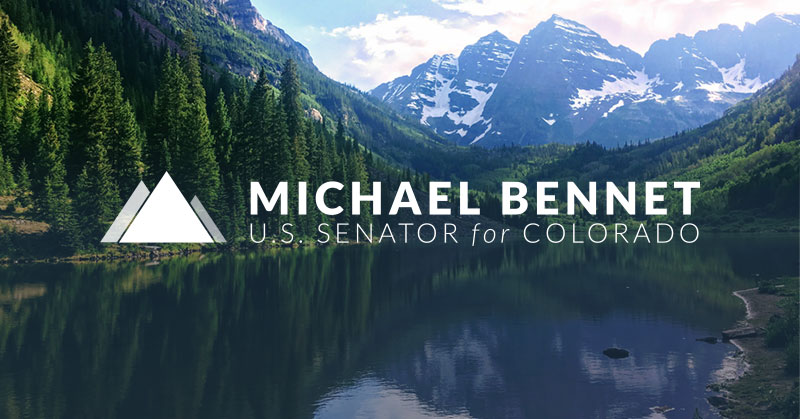Source: United States Senator for Colorado Michael Bennet
Washington, D.C. –– Last week, the president and CEO of the National Wildlife Federation, Collin O’Mara, penned an op-ed in The Hill urging Congress to include investments in forest restoration and wildfire resilience in the Build Back Better Act. He specifically pointed to Colorado U.S. Senator Michael Bennet’s Outdoor Restoration Partnership Act as a model to make “the meaningful investments needed in our forests, rangelands, and watersheds by encouraging partnerships between federal, state, and tribal agencies.”
The House Agriculture Committee’s budget proposal makes a $40 billion investment in America’s federal, non-federal, urban, and community forests in partnership with states, local governments, tribes, and landowners. Consistent with Bennet’s Outdoor Restoration Partnership Act, it includes tens of billions of dollars to support locally-led forest and watershed restoration, wildfire mitigation, hazardous fuels, and vegetation management projects, along with funding to enhance outdoor access and restore wildlife habitat. It also provides $4.5 billion to establish a Civilian Climate Corps to support this work.
“As many lament, we no longer have a fire season, we have a fire year. Just this calendar year, more than 40,000 wildfires have burned more than 5 million acres — or the equivalent of the state of Massachusetts — according to the National Interagency Fire Center.”
“Fortunately, Sen. Michael Bennet (D-Colo.) has proposed legislation that would make the meaningful investments needed in our forests, rangelands and watersheds by encouraging partnerships between federal, state and tribal agencies.”
O’Mara continued: “The Build Back Better Act will not only make our forests and grasslands healthier and more resilient to wildfire, it will spur the recreation economy as access and opportunities for hunting, fishing and other outdoor pursuits are expanded. By some estimates, for every dollar spent in restoration, $15 dollars will be generated in economic activity.
“We can’t wait any longer. Congress needs to pass the Build Back Better Act to safeguard our wildlife, our lands and waters and our rural communities. Our children — and grandchildren — deserve nothing less.”
The full op-ed is available HERE and below.
The West has always been shaped by fire. It’s part of its ecology. But the climate change-driven megafires we have now are bigger and more destructive. They darken our skies with smoke, even thousands of miles away. They destroy homes and businesses, displace wildlife, threaten water supplies, scar landscapes and could cost taxpayers $20 billion dollars this year.
As many lament, we no longer have a fire season, we have a fire year. Just this calendar year, more than 40,000 wildfires have burned more than 5 million acres — or the equivalent of the state of Massachusetts — according to the National Interagency Fire Center.
The impacts that follow these devastating fires can continue to play out for years after the flames are out. Case in point: the disastrous mudslides this summer in Colorado that followed last year’s fires. The debris shut down Interstate 70 for more than two weeks, will cost over $100 million to repair and caused immense financial consequences for businesses impacted by the disruption in commerce.
As President Biden noted this week in Boise, climate-fueled disasters are becoming increasingly common, but we can mitigate wildfire and mudslide risks and help protect nearby communities from their impacts while our leaders pursue larger solutions to the climate crisis.
Fortunately, Sen. Michael Bennet (D-Colo.) has proposed legislation that would make the meaningful investments needed in our forests, rangelands and watersheds by encouraging partnerships between federal, state and tribal agencies. The House just put it into the budget reconciliation bill, known as the Build Back Better Act, providing $40 billion to restore our forests, improve wildlife habitat, while creating millions of good-paying jobs in rural areas. There are also investments to restore the iconic grasslands and sagebrush steppe, which increasingly have been overrun with cheatgrass that exacerbates drought and leads to catastrophic rangeland fires.
The Build Back Better Act will not only make our forests and grasslands healthier and more resilient to wildfire, it will spur the recreation economy as access and opportunities for hunting, fishing and other outdoor pursuits are expanded. By some estimates, for every dollar spent in restoration, $15 dollars will be generated in economic activity.
It’s also just smart fiscal policy. Investing in forest and watershed restoration helps save landowners and local governments money because when the fires do come, they’ll likely be less catastrophic. It is exactly the kind of investment in resilience that our communities need right now. As the president also noted, for every dollar we invest in natural resilience in building back better, we save $6 in the future.
Congress has taken an important first step in approving investments in traditional infrastructure of roads and bridges. Now it’s time to invest in our natural infrastructure to prevent sprawling wildfires, mudslides and other impacts of climate change. We can’t wait any longer. Congress needs to pass the Build Back Better Act to safeguard our wildlife, our lands and waters and our rural communities. Our children — and grandchildren — deserve nothing less.
Collin O’Mara is president and CEO of the National Wildlife Federation.
